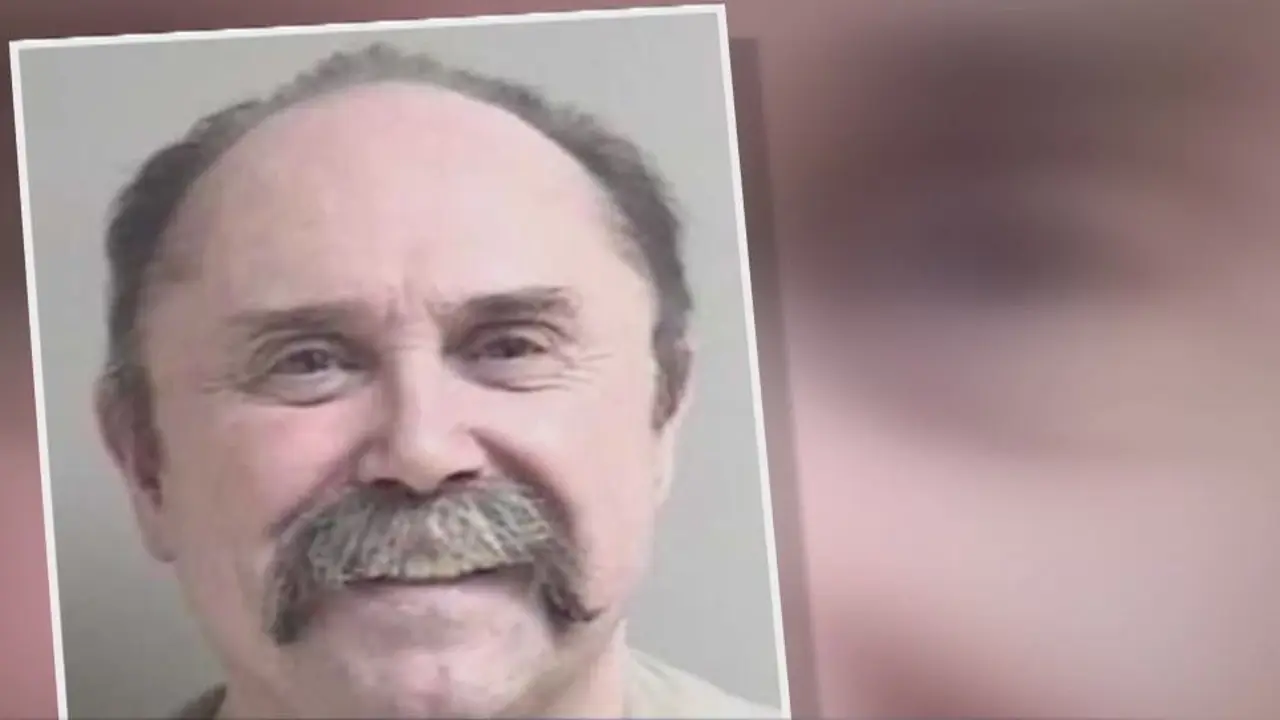For nearly seven years, Arthur Rathburn and his wife, Elizabeth, ran a black-market business dealing diseased human body parts, federal prosecutors say.
Warning: Graphic content, readers’ discretion advised. This article contains a recollection of crime and can be triggering to some readers discretion advised.
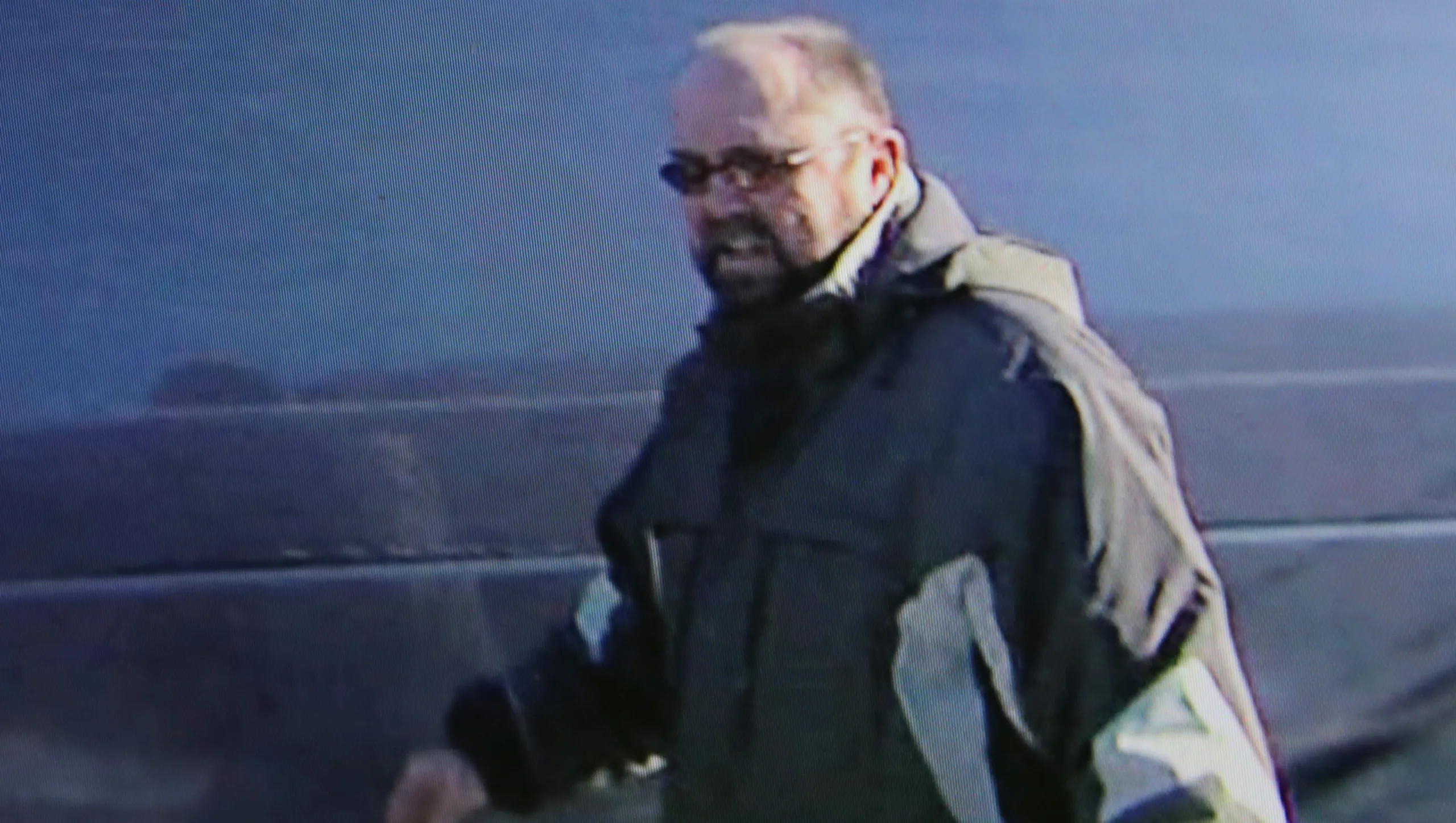
Arthur Rathburn is accused of dismembering donated bodies with a chainsaw and renting HIV-infected parts to medical professionals. Prosecutors hailed his arrest as a crackdown. But for years, Reuters found, authorities let him do business despite signs of his bizarre practices.
Grosse Pointe Park businessman is accused of supplying infected body parts to unsuspecting medical researchers.
When the feds raided Arthur Rathburn’s Detroit warehouse four years ago, it was “filthy,”
FBI Special Agent Leslie Larsen testified during the first day of the cadaver dealer’s trial in federal court Friday.
Larsen said she saw piles of dead flies, including in the “cutting room,” dry blood on the floor and body parts frozen together at the facility on Grinnell Avenue that had no heat, running water or working bathrooms.
 Arthur Rathburn walks out of a federal courthouse in Detroit last month. (Regina H. Boone/Detroit Free Press via AP)
Arthur Rathburn walks out of a federal courthouse in Detroit last month. (Regina H. Boone/Detroit Free Press via AP)
According to her testimony, body parts were stored in a variety of containers such as Rubbermaid bins and 55-gallon drums; tools, including a chainsaw and circular saw, were at the warehouse and in one area, agents found human remains and food next to each other.
“We seized human remains, documents and tools,” Larsen testified of the December 2013 raid.
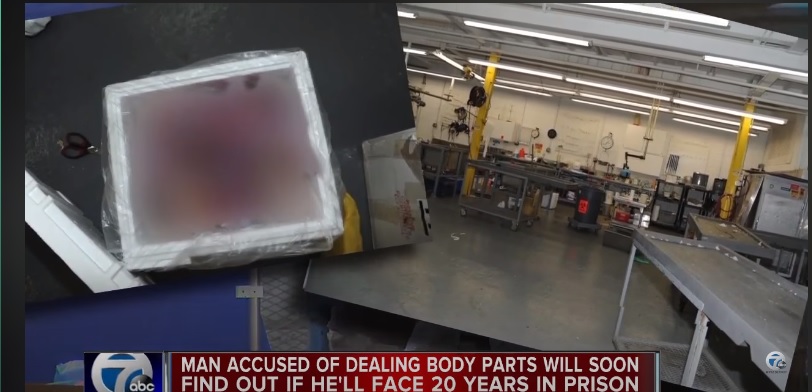
Rathburn, a Grosse Pointe Park businessman, ran a body parts business out of Detroit and was indicted in 2016 following an investigation that spanned years. He’s accused of supplying infected body parts to unsuspecting medical researchers. He faces charges of wire fraud, transportation of hazardous material and making false statements. Lawyers gave opening statements Friday and told jurors grisly evidence would be presented during the trial.
“A number of the photographs … are gruesome,” Assistant U.S. Attorney John Neal said.

Jurors were given a folder Friday with pictures showing conditions at the warehouse and reviewed them as Larsen testified, but prosecutors did not put those photos on a large screen set up in the courtroom.
During cross-examination, defense attorneys showed pictures on the screen, including cleaning products on a shelf, a bottle of disinfectant and the area described as the “cutting room” with clean tools hanging on the wall. The room didn’t appear dirty in a picture, but Larsen said the floor was covered in dirt.
Two witnesses took the stand Friday, including Dr. Kevin Vorenkamp, an anesthesiologist in Seattle. He testified doctors won’t accept bodies that have tested positive for diseases like HIV and hepatitis because of concerns about cutting into them.

Under the deal to supply the cadaver, Vorenkamp expected a body needed for an anesthesiology conference in Washington, D.C. to be free of those diseases, but later found out it wasn’t.
Prosecutors have alleged Rathburn purchased body parts from suppliers in Arizona and Illinois, stored them in Detroit and supplied them to researchers.
Court records show a human cadaver is worth $10,000 to $100,000 if sold in parts.
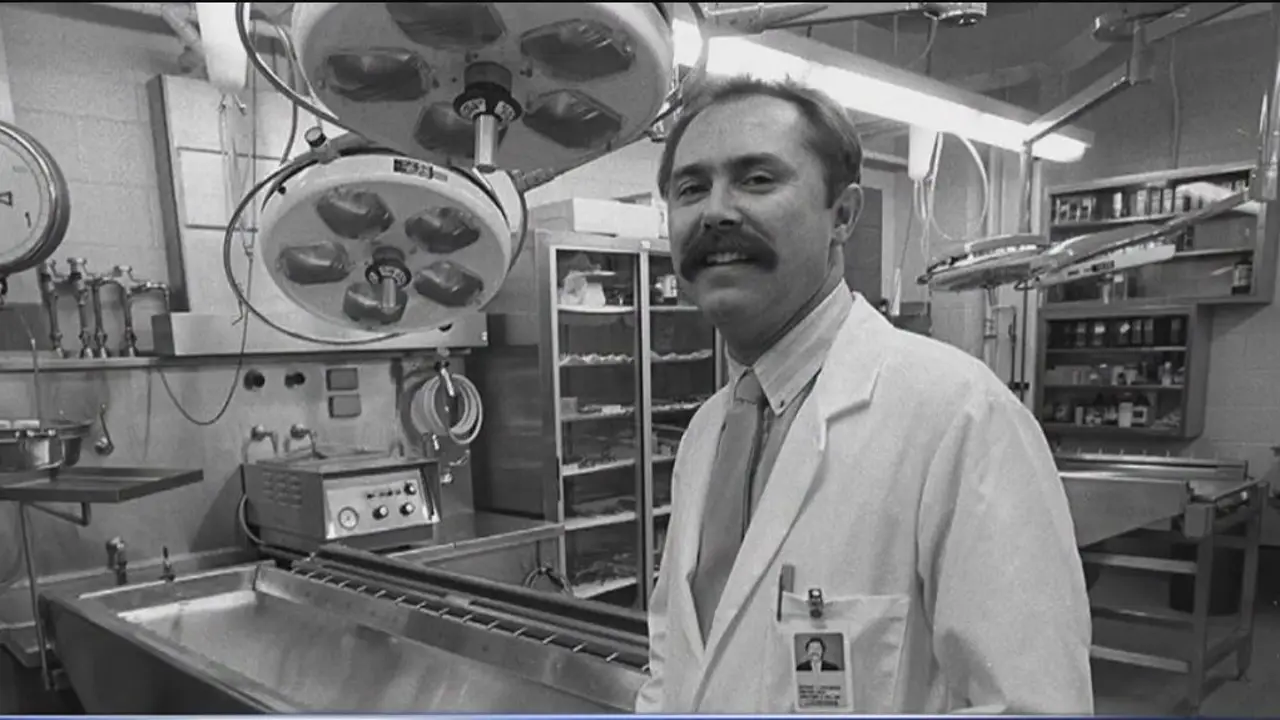 EARLY DAYS: Arthur Rathburn at the University of Michigan, before he became a full-fledged body broker. REUTERS/Courtesy of Peter Yates
EARLY DAYS: Arthur Rathburn at the University of Michigan, before he became a full-fledged body broker. REUTERS/Courtesy of Peter Yates
DETROIT – When U.S. authorities arrested Arthur Rathburn last year, they hailed their investigation as a milestone in efforts to police a growing industry: brokers who acquire bodies donated to science, dissect them and sell or lease the parts for profit.
The indictment alleges that Rathburn stored bodies destined for medical education and training in grisly conditions and dismembered them with a chainsaw. He is accused of endangering clients, mostly health care workers, by renting them cadavers and severed heads that were infected with HIV and hepatitis.
A government news release touted the arrest as “a significant step,” one that demonstrates that protecting the public is “a high priority.”

But authorities missed repeated opportunities to rein in Rathburn, Reuters found. Warning signs about his activities date back more than a dozen years.
In the mid-2000s, for example, New York state health inspectors twice reprimanded him for failure to provide documentation that bodies he acquired were in fact willingly donated. Rathburn also had been on the radar of federal authorities since 2010, when border agents first questioned him about 10 heads he was transporting from Canada, court records show.
Over the next three years, agents documented five similar cross-border shipments, one that included a severed penis. But agents did not raid Rathburn’s warehouse until December 2013. In the meantime, he acquired, sold and rented out more bodies and parts.
The failure to intervene sooner shows how easily brokers can evade government scrutiny and points to a gap in U.S. law surrounding the body trade, an industry that typically targets the poor with incentives such as free cremation. Rathburn and his then-wife were charged with defrauding customers, not with selling or desecrating human remains.
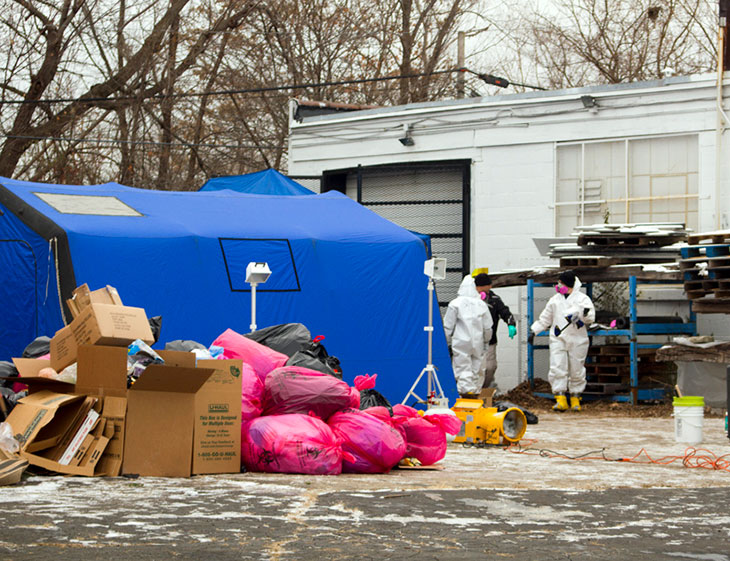
Selling or leasing body parts is not a federal crime and is largely unrestricted in all but a few states.

Rathburn, 63, faces trial in January on charges of defrauding health care workers and lying to federal agents. He has pleaded not guilty and remains jailed. His ex-wife, Elizabeth Rathburn, pleaded guilty to one count of fraud and is cooperating with prosecutors. Neither the Rathburns nor their attorneys responded to requests for comment for this story. The FBI also declined to comment.

“Because the laws vary so much from state to state,” Burkel said, “there is a lot of opportunity for people like Mr. Rathburn to do it without any sort of oversight.”
Rathburn’s alleged victims included not only donors and their families but also the doctors, dentists and other health care workers who acquired parts from him.

Steve Schomisch, who directs surgical training at Case Western Reserve School of Medicine in Cleveland, learned recently how unregulated the industry can be. Federal authorities told him that a head Rathburn supplied to train Case Western neurosurgeons in 2013 was among a number of body parts that could not be traced to a donor, raising questions about the donation’s legitimacy.
“We felt betrayed,” Schomisch said. “Then we said, ‘What can we do to make sure this doesn’t happen again?’”
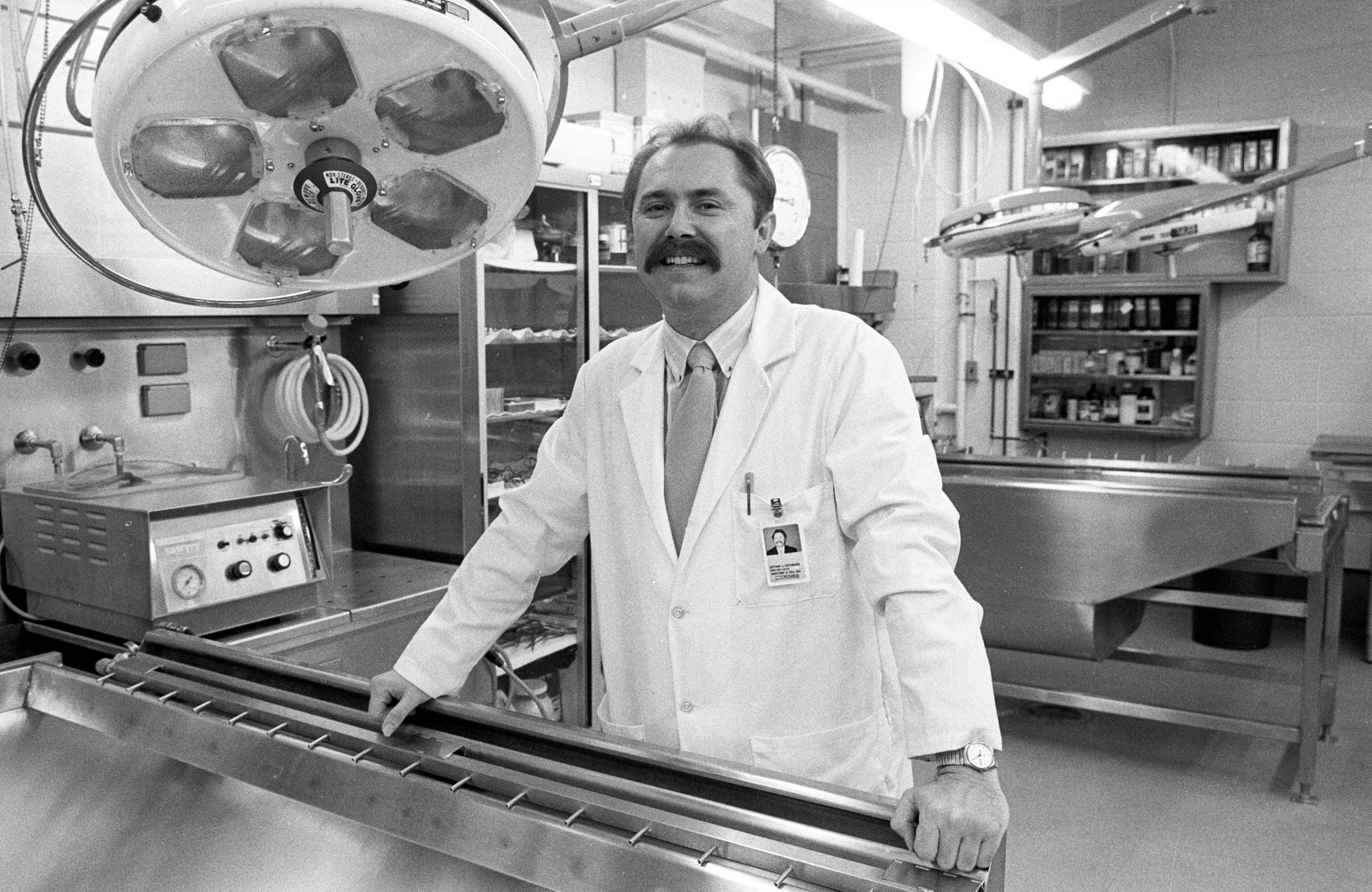
Rathburn was hired in 1984 by the University of Michigan body donation program, which uses cadavers for anatomy classes and research. He was 30 years old with a community college degree and a work ethic that endeared him to better-educated colleagues.
“He had a charisma about him,” said former supervisor Stuart Baggaley.
Rathburn arrived at a critical time. University archives show that Rathburn helped the program rebound from complaints by donor families about poor customer service.
“He was just energetic, doing something all of the time,” said Burkel, who led the program during those years. “He had a lot of ideas.”
One merited publication in a scientific journal and a patent: “A State-of-the-Art Embalming and Autopsy Station,” a device that promised safer and easier preparation of dead bodies.
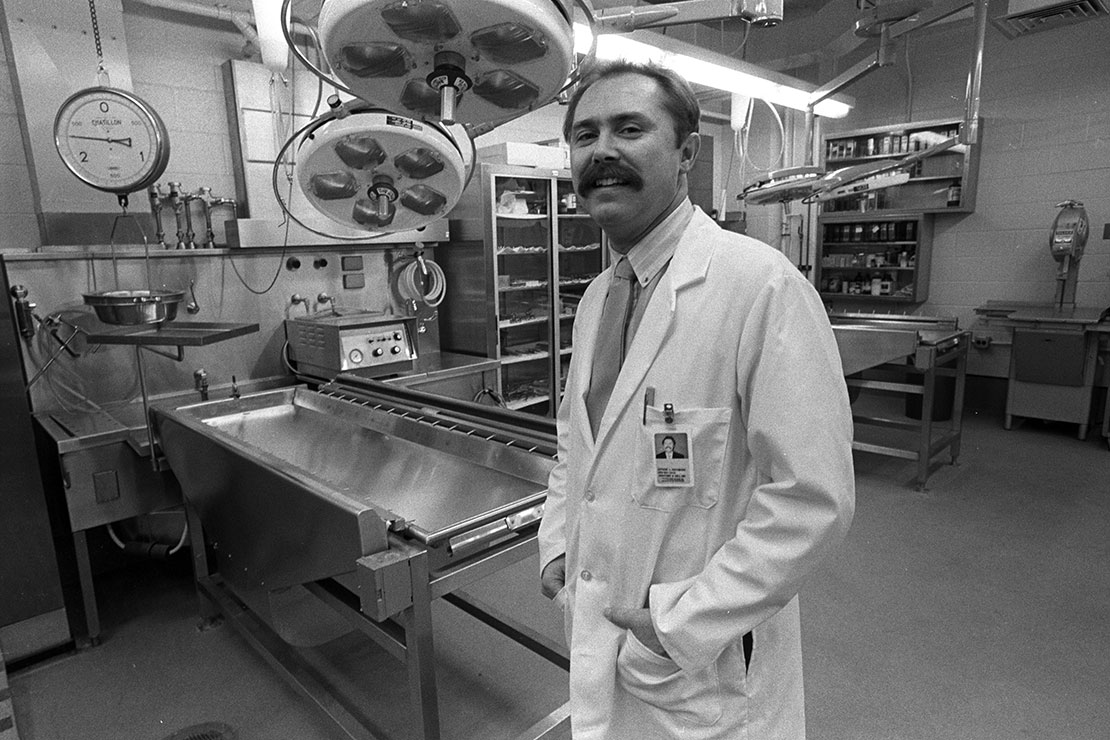
In 1988, Rathburn was prominently featured in the monthly Ann Arbor Observer newspaper. He expounded on the significance of cadavers in the classroom and told a whimsical tale about his entry into the business – a friend bet him $10 he wouldn’t fill out a funeral home job application. He did. In a photograph accompanying the story, Rathburn wears a tie, lab coat and broad smile.
Two years later, however, Rathburn left the school, records show, following unspecified allegations of misconduct. He obtained a court order barring release of his personnel records. But recently, two people with direct knowledge disclosed the alleged transgression: Rathburn mishandled the donor ashes, a cardinal sin in the funeral industry.
With that information shielded from public view, Rathburn set out in the early 1990s to sell body parts.
One person Rathburn impressed was Ed Eichenlaub, then a doctor’s assistant in Pittsburgh who began working with him to supply body parts for research and surgical seminars.
“I would call up Art and say, ‘I need half a dozen human heads,’” he said. Later, Eichenlaub said, he worked for Rathburn handling body parts at medical seminars in New Orleans, San Francisco and Chicago.
“I won’t lie to you. It was creepy,” said Eichenlaub. “You arrive at this place and there is this huge ice chest and you open it and there are a dozen heads. They’re wrapped up, but it takes a special person to do this.”
 “CORE” PROBLEM: The New York Department of Health repeatedly tried to get Arthur Rathburn to maintain donor consent forms that would prove the human remains he obtained had been willingly granted. Source: New York Department of Health, 2005
“CORE” PROBLEM: The New York Department of Health repeatedly tried to get Arthur Rathburn to maintain donor consent forms that would prove the human remains he obtained had been willingly granted. Source: New York Department of Health, 2005

In 2004, a New York inspector traveled to Rathburn’s warehouse in Detroit. Though Rathburn was notified of the visit a week in advance, the inspector still found serious deficiencies – flaws that demonstrate how body parts can enter a black hole of accountability after being donated, dissected and shipped to customers. Among the problems: Rathburn could not produce documents proving that bodies were donated willingly.
There are no such records for whole bodies and body segments received for use at the facility,” the report said.
Rathburn, the records show, contended that privacy laws and supplier policies prevented him from providing such proof. New York officials said that was no excuse for not supplying consent forms.
“Your plan of correction,” inspectors wrote him in 2005, “does not address the core of this deficiency.”

In 2006, officials told Rathburn he could no longer ship body parts to New York until he resolved their concerns. In 2007, New York health officials issued Rathburn a provisional license, allowing him to resume operations there.
In a statement to Reuters, New York officials said they conducted a “thorough examination.” A New York health official added that her agency did not notify Michigan authorities at the time because “such a regulatory agency does not exist” in that state. The official did not elaborate on what agency that might be.
The records show that, from 2005 through 2007, Rathburn’s business continued unabated outside New York as he distributed more than 200 severed heads.
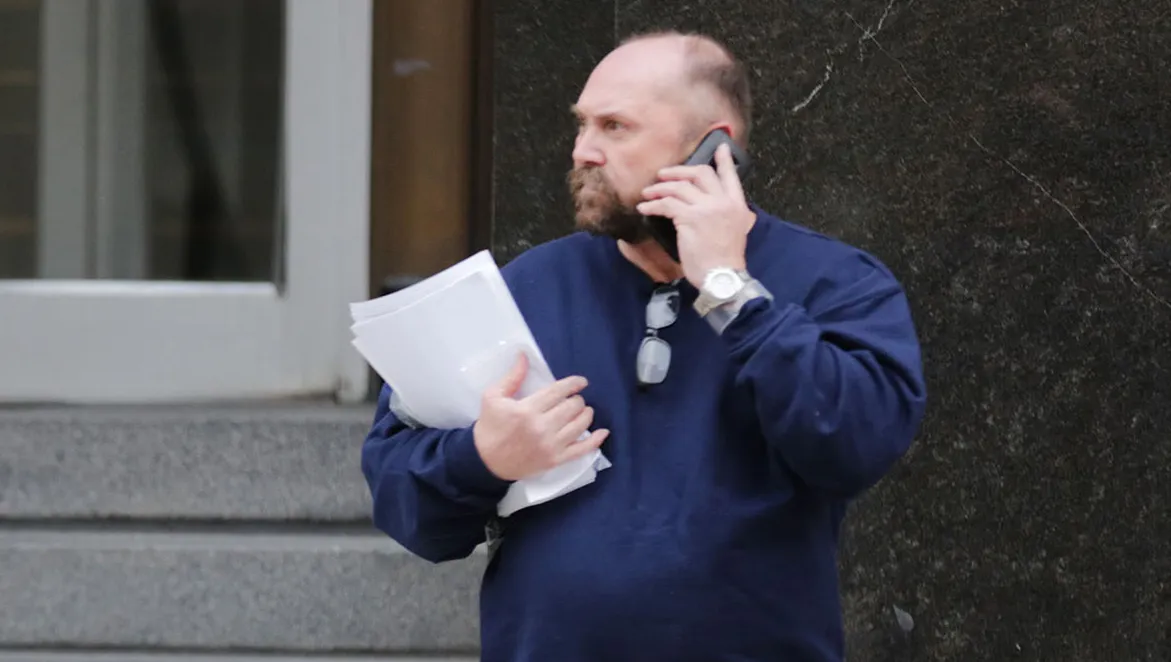
He dismembered the bodies with a chainsaw, stored the parts — including heads and torsos — and prepared them for shipping, while she took orders from customers, according to court documents.
The Rathburns were charged earlier this year after investigators say they discovered that the couple from Michigan had been renting out often-diseased body parts to medical and dental students.
“This alleged scheme to distribute diseased body parts not only defrauded customers from the monetary value of their contracts, but also exposed them and others to infection,” U.S. Attorney Barbara McQuade said in a January statement. “The alleged conduct risked the health of medical students, dental students and baggage handlers.”

The grisly case took a new turn earlier this week when Elizabeth Rathburn agreed to a plea deal, admitting that in 2012 she took body parts contaminated with hepatitis B and HIV to an American Society of Anesthesiologists conference in Washington and claimed they were free from disease, according to the agreement.
She pleaded guilty to wire fraud and agreed to testify against her estranged husband.
She also revealed that he had recently sent her a birthday present — violating a no-contact order, according to the Detroit Free Press.
“Oh, Jesus,” Arthur Rathburn snapped in court, according to the newspaper. “No contact means no contact,” his attorney said.
The U.S. Attorney’s Office said Thursday that his bond had been revoked and he had been taken into custody because he violated the order.
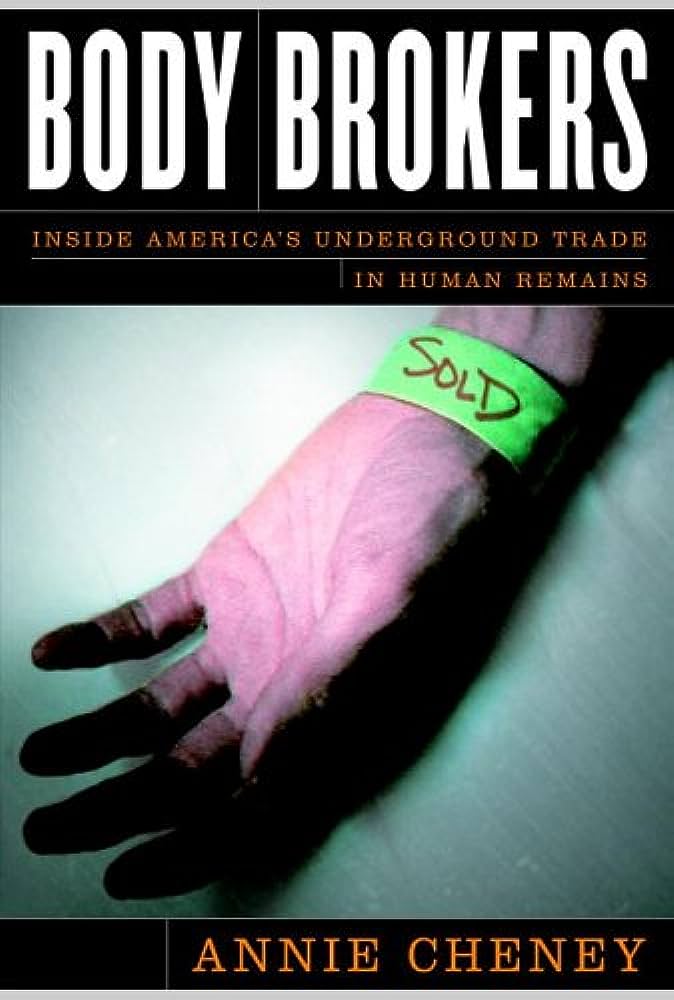
Arthur Rathburn came into public view when he was mentioned in a book called “Body Brokers: Inside America’s Underground Trade in Human Remains,” credited as an “investigative exposé of the lucrative business of procuring, buying, and selling human cadavers and body parts.”
It described Rathburn as “a tall man with an impressive mustache and a friendly demeanor” and said he had worked at the University of Michigan Medical School.
“At the university, he was responsible for tagging corpses and setting them up for students,” the book read. “When necessary, he arranged for the shipment of corpses to other medical schools in need of bodies, and to brokers.”
Rathburn was fired from his job at the university, which said he had been selling bodies for profit, according to the Detroit Free Press.

In 1989, the newspaper said, he set up his own shop as an independent body broker.
The Free Press reported that it wasn’t until federal authorities noticed “bizarre shipments arriving for Rathburn at Metro airport, including a bucket full of human heads that arrived from Israel one year,” that they started to investigate him.
The Free Press reported that it wasn’t until federal authorities noticed “bizarre shipments arriving for Rathburn at Metro airport, including a bucket full of human heads that arrived from Israel one year,” that they started to investigate him.
From January 2007 until December 2013, authorities said, Arthur and Elizabeth Rathburn ran International Biological Inc., a Detroit-area corporation that purchased donated bodies from biological resource centers and rented them to researchers.
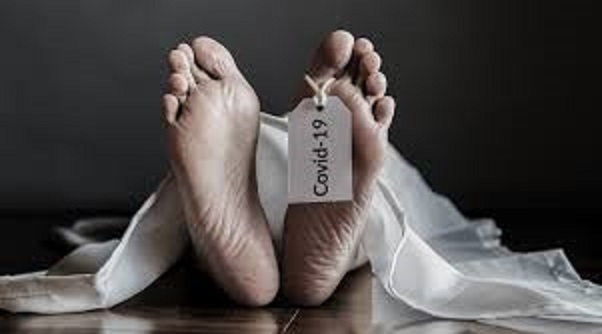
Human bodies bring in $10,000 to $100,000; brains, $600; and elbows and hands, $850, according to court records cited by the Free Press.
But they are suppose to be free of disease. Authorities said the macabre Michigan morticians rented out human remains that they knew had tested positive for hepatitis and HIV, among other diseases.
“Arthur and Elizabeth Rathburn sometimes obtained diseased remains from their suppliers at a reduced cost, due to the fact that end users of human remains generally reject infectious bodies and body parts for use in medical or dental training,” according to the indictment.
The couple would rent the remains to customers, “falsely representing to those customers that the remains were free of certain infectious diseases,” the indictment added.
The court documents said Arthur Rathburn increased the couple’s profit by not complying with standardized sanitation practices.

“Arthur Rathburn used a chainsaw, band saw and reciprocating saw to dismember bodies without taking sanitary precautions,” according to the indictment.

He “stored human heads by stacking them directly on top of each other without any protective barrier, apparently disregarding any risk of cross-contamination between infectious and non-infectious remains.”
Pools of frozen blood and bodily fluids were found in the freezers, the documents said.
The Rathburns were indicted in January on 13 counts, including wire fraud; aiding and abetting; transporting hazardous material; and making false statements.
The next month, Arthur Rathburn was released on bond.
Moments after his release, he stood on a street corner in a navy blue sweatsuit and orange Crocs, telling reporters it hadn’t been easy.
“I’m doing all right,” he said, according to the Free Press. “Or at least I’m trying to.”
If convicted, Arthur Rathburn could face up to 20 years in prison.
On Monday, Elizabeth Rathburn took her plea deal in the case.

In 2012, authorities said, she took diseased body parts that the Rathburns’ company had purchased at a discount to the American Society of Anesthesiologists conference; to do so, she filled out a form declaring that the remains had tested negative for HIV and hepatitis A, B and C, according to the plea agreement.
The court documents say conference organizers would not have accepted the specimens “had the organization known of the positive HIV or hepatitis test results.”
Under the plea deal, she agreed to pay $55,225 in restitution to the American Society of Anesthesiologists.
Elizabeth Rathburn’s sentencing is set for July 18. She faces up to 10 months in jail.
BAD SHIPMENT: Veteran body broker Walter Mitchell once sold human parts to Arthur Rathburn. He stopped in 2006, he says, after an airline official told him Rathburn had failed to pick up two human torsos shipped to Detroit’s airport. REUTERS/Caitlin O’Hara

Walter Mitchell, former owner of BioGift, an Oregon body donation firm, said he stopped supplying body parts to Rathburn after a 2006 incident. A week after shipping two human torsos to Rathburn in Detroit, Mitchell got a call from the airline that transported them. No one had picked up the packages at the airport.
“When are you going to come?” an airline employee asked, according to Mitchell. “The coolers are leaking and it smells.” Rathburn ultimately picked up the torsos, Mitchell said.
“ILL-CONCEIVED PLAN”
In the mid-2000s, Rathburn launched an ambitious expansion, one that would lead to bankruptcy.
For $1.8 million in 2005, Rathburn’s company bought a funeral home and warehouse in Richmond, Virginia. People familiar with the deal said he chose the properties because they were strategically located near two interstate highway exits, a convention center and a medical school. The neighborhood also was on the upswing.

“They were going to bring in loads of cadavers to be stored at the warehouse and, as needed, transferred to the funeral home, then to medical training events,” recalled former city councilman Bill Pantele. “Having invested a lot of years in revitalization of that neighborhood, I thought, ‘This is a bad idea.’”
Faced with community opposition, Rathburn abandoned the plan and struggled financially. While his Michigan company grossed almost $900,000 annually from 2006 to 2008, records show, debts mounted.
By late 2008, when Rathburn’s company declared bankruptcy, it reported assets of $72,130 and debts of $621,905. It owed $210,402 in back taxes and at least $175,000 to companies supplying body parts. In court records, Rathburn described the Virginia venture as “an ill-conceived plan.”
As part of the bankruptcy filing, Rathburn provided a list of assets. The inventory included 14 chairs, 10 file cabinets, 91 heads, 18 spines, six hips and a copy of the Hippocratic Oath. He put the total market value of the body parts at $160,900.
Despite the bankruptcy, Rathburn continued to operate. Through 2013, six body brokers shipped him more than 800 body parts worth hundreds of thousands of dollars, court and New York health department records show.
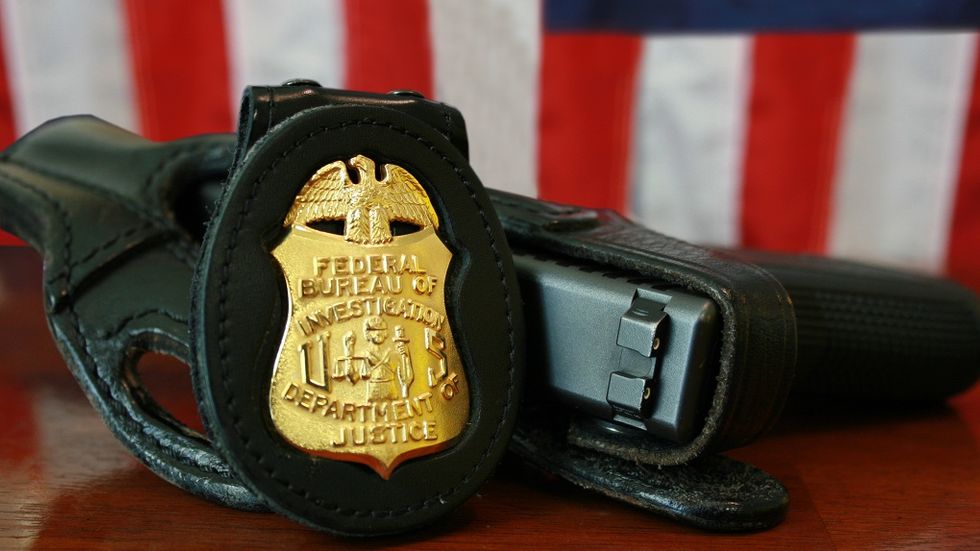
And federal authorities came into contact with Rathburn or his employees a dozen times – including six border crossings – from 2010 through 2013.
In 2010 and again in 2011, federal law enforcement records show, Rathburn was stopped returning from Canada. Each time, he was carrying 10 human heads.

In 2012, picnic-style coolers containing eight heads in red liquid arrived at the Detroit airport. Border agents confronted Rathburn. Among the lies agents allege Rathburn told them was that the liquid wasn’t blood, but Listerine mouthwash, used to preserve specimens.
The alleged lies to the federal agents appeared to accelerate the investigation of Rathburn, court records show, though no one intervened to search his warehouse or stop his business. Seven months later, his indictment alleges, Rathburn sent a cadaver infected with Hepatitis B and HIV to a medical convention in Washington, D.C. No attendees were harmed, although they would not learn of the potential danger for years.

In August 2013, New York officials inspected the Detroit warehouse once more – and again reported problems with Rathburn’s ability to keep proper records for each body part. No other action was taken against him at the time. Rathburn continued to acquire bodies for $5,000 and heads for $500 until late 2013.
In December 2013, after nearly four years of investigation, the FBI raided Rathburn’s warehouse and office. Inside, authorities said, agents found “thousands” of body parts.
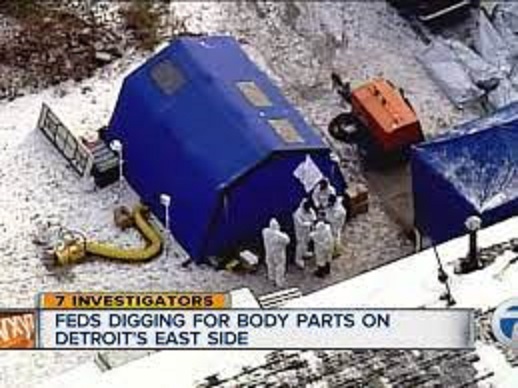
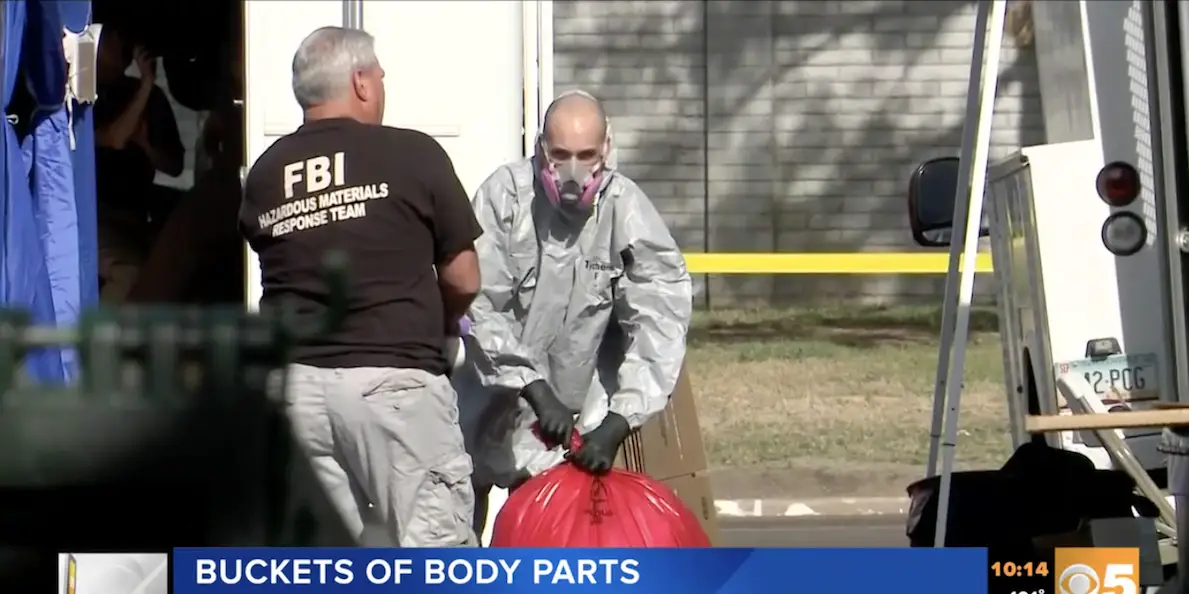


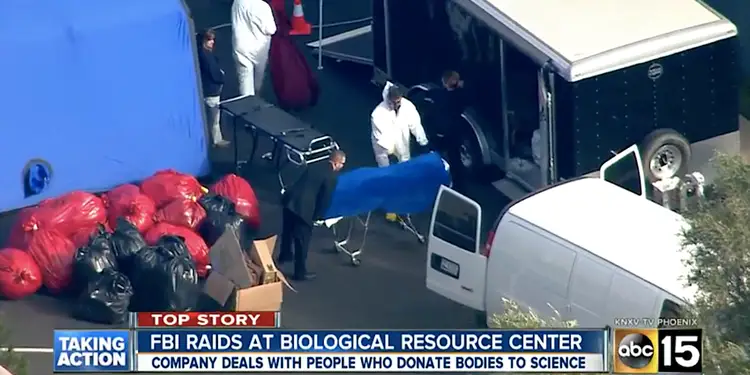
The feds honed in on a key link–notorious Detroit body broker Arthur Rathburn. He’s now in federal prison, and evidence collected in his case led federal investigators to the Chicago area, to Donald Greene Sr. and Donald Green Jr.

CBS 2 first broke the story of precious cargo and broken promises that donated bodies would go to medical research in 2015. Those promises were allegedly made by Greene Sr. and his namesake.
The father and son duo was behind the now shuttered Biological Resource Center of Illinois.
Those broken promises led the FBI to the center more than four years ago.
Bodies and body parts weren’t donated at all, but in some cases were sold on the black market.
It goes on saying bodies known to have HIV, sepsis and hepatitis were kept on ice and then sold, some for up to $100,000.
In the charges filed, United States attorneys repeatedly call it “a scheme to defraud customers of the Biological Resource Center of Illinois.”
It’s not illegal to dismember and broker body parts, per se. It is illegal to knowingly sell remains positive for infectious diseases, like what is alleged the Greenes did from 2008 to 2014.

The federal document charging the Greenes alleges the men sold to Detroit Medical Center’s sports medicine department at least one specimen that “had previously tested positive for hepatitis. This fact was concealed from DMC by Donald A. Green Sr.’s scheme to defraud.”
Greene Sr. is charged with wire fraud.
Greene Jr. faces a felony for intentionally concealing a crime.
CBS 2 was not able to reach the Greenes for comment.
The U.S. attorney’s office in Detroit, which is handling the case, would not comment on anything beyond what’s in the documents.
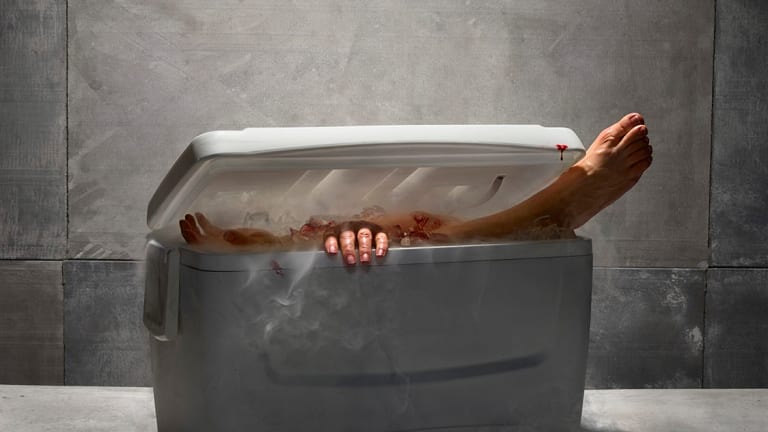
A federal judge on Monday, Oct. 15 ruled the government may cremate more than 117 specimens of human remains, including severed heads, torsos and fetuses, seized from a Detroit body broker’s warehouse by the FBI in December 2013.
Once cremated, the remains are expected to be returned to relatives of the original body donors, Assistant U.S. Attorney Timothy Wyse indicated in Detroit’s federal court during a post-conviction hearing for Arthur Rathburn.
Rathburn, the 64-year-old Grosse Pointe Park man who owned and operated International Biological Inc. — a company the FBI says kept a “cutting room” inside the Detroit warehouse for dividing bodies into parts for shipment — was convicted on federal charges of fraud and illegal transport of hazardous biological materials in May.
Raids
Investigators follow raids right here in Detroit. As well as phoenix and chicacgo .
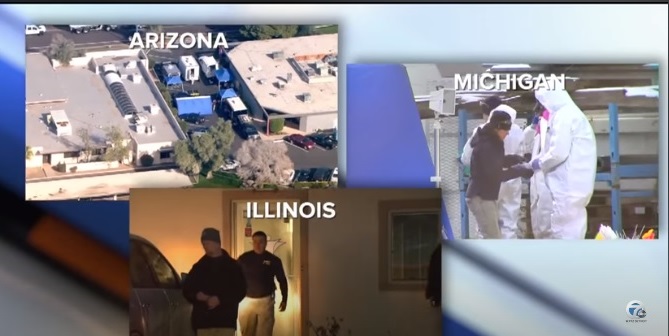
jim kirchner how has been in this story from the vert beginning

Jim: these are the deferal documents unsealed that that really contect the dots.among the trhee citites, we´re on the east side of detroiy where this part of the story unfolded about 15 mounths ago.

Jim: see these ice coolers ? they may have held human body part at one time .

Jim: this warehouse is now shuittered,the hiuband and wife whlo ran this buisness are out of buisness but tonight there are not out of troube.


Jim :December of 2013 ,federal agent removed, body part.sources say of more than a thousand different people heads . arms, legs, cut up and cept on iceNot embalmed. so they could be used for practicing medical and dental procedures around the world.


Jim: The papper trail led authorities to raid this human body donation program in phoenix.
In january of this year a similar raid on a another human body donation center. on surburbian chicago.

According tot he documents now unsealed ,donors were told body parts

would not …..
 cold not be sold for profit.
cold not be sold for profit.


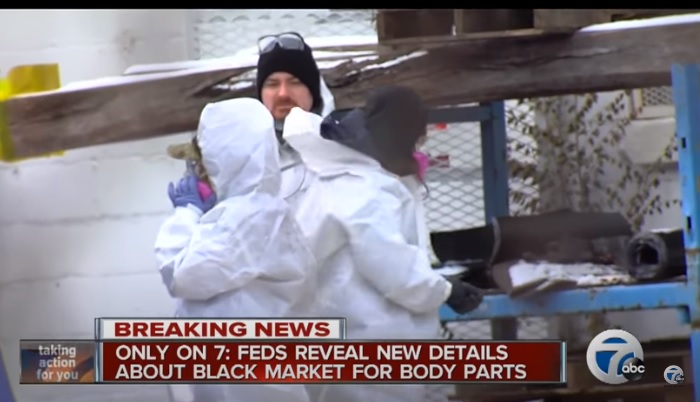
The feds found the bodies donated. in chicago were sold for profit.
full bodies: five thousand dollar.
Heads : five hundred dollars.
arms 750 dollar.
Donated bodies were supposed to be tested and free of any diseases but r the feds found they had several infections diseases Hiv ,Hepatitis, sepsis MRS and they were sold any way. that´s why fedral investi9gators wore hazmat suits during all three raids.
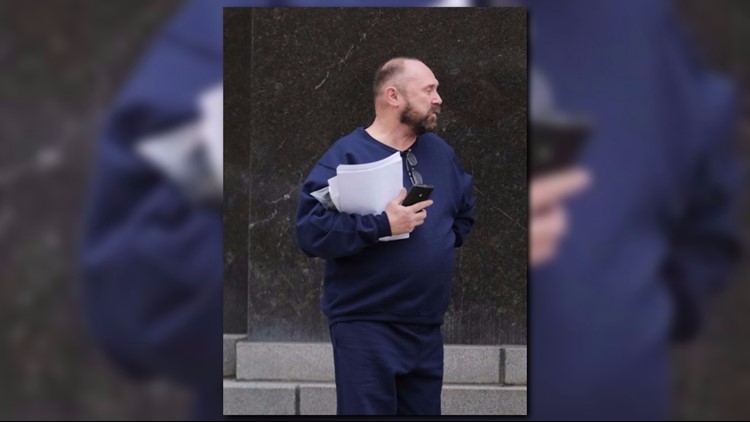
The U.S. Attorney’s Office accused Rathburn of knowingly renting diseased body parts to unwitting customers for use in nearly 140 medical training courses between 2000 and 2013. According to the government, Rathburn’s business model involved purchasing cadavers from larger private tissue donor companies. In some cases, he obtained bodies of donors who died of infectious diseases, including HIV and hepatitis, at a discount.

In this Feb. 2, 2016, file photo, Arthur Rathburn of Grosse Pointe Park, Mich., walks out of Theodore Levin United States Courthouse in Detroit. Prosecutors are seeking a 14-year prison sentence for Rathburn convicted of dealing diseased body parts for medical training. (Regina H. Boone / Detroit Free Press)

Arthur Rathburn is expected to serve 6 years, 10 months in prison after receiving a 9-year sentence, with credit for 2 years and 2 months already served.
In January, Rathburn was found guilty of selling body parts with HIV and hepatitis A, B and C to doctors and dentists for medical research.22 maj 2018
Timeline

December 7, 2020 – Arthur Rathburn filed a motion for Reduction of Sentence Pursuant to 18 U.S.C. § 3582(C)(1)(A). In this motion, Arthur Rathburn seeks to serve the remainder of his sentence in home confinement. The Government opposes this motion.
A motion hearing has not been scheduled as of the date of this posting.
Future court dates and the outcome of this motion will be posted to this webpage.

March 25, 2019 – Pursuant to an Appeal of Defendant’s Conviction filed by Arthur Rathburn, an Oral Argument has been scheduled by the Court of Appeals. This hearing will take place on May 8, 2019 before the 6th Circuit Court of Appeals, Cincinnati, Ohio. Appeal hearings are held before a panel of judges whose decisions are rendered in the form of a written legal opinion weeks or months after the oral argument. This website will be updated with the decision of the Court.
May 22, 2018 – Defendant Arthur Rathburn was sentenced by the Honorable Paul D. Borman to a term of 108 months incarceration. Upon his release from prison, the defendant will serve a term of three years supervised release. Restitution for the victims’ families will be considered. A restitution hearing has not yet been scheduled by the Court. Updates regarding this case and the date for the Restitution Hearing will be posted to this website.
March 13, 2018 – Defendant Elizabeth Rathburn was sentenced by the Honorable Paul D. Borman to a term of 2 years probation.
February 16, 2018 – The time for the sentencing hearing for defendant(s), Elizabeth Rathburn, has been re-set. The hearing is now scheduled to take place at 11:00 a.m. on March 13, 2018. This hearing will take place before the Honorable Paul D. Borman in Courtroom 737 of the United States District Courthouse.

January 25, 2018 – Due to the large number of victims identified in this case, and in an effort to assist victims more efficiently, this webpage has been developed to advise of information relating to the above case. This does not replace written notification to those identified as victims, it simply provides an additional resource from which to obtain information.
Charges were filed against defendants Arthur Rathburn and Elizabeth Rathburn. The lead prosecutor for this case is John K. Neal.
On March 21, 2016, defendant Elizabeth Rathburn pled guilty to one count of Fraud by Wire, Radio, or Television. Any remaining counts will be disposed of at the time of sentencing. As a result of the guilty plea, there will be no trial involving this defendant.

A sentencing hearing for this defendant has been scheduled for Tuesday, March 13, 2018 at 3:00 p.m., before the Honorable Paul D. Borman, United States District Court, 231 W. Lafayette, Courtroom 737, Detroit, MI 48226.
Defendant Arthur Rathburn elected to exercise his right to a jury trial. On January 22, 2018, the jury convicted Arthur Rathburn of one count of Illegal Transportation of Hazardous Materials and seven counts of Fraud by Wire, Radio, or Television.
The defendant was acquitted of one count of False Statements and two counts of Fraud by Wire, Radio, or Television. Two counts of False Statements were dismissed. We recognize that the statutory language may be interpreted as generic and harsh. We want to emphasize and provide assurance to the victims identified in this case that the statutory language is in no way is it a reflection of how the prosecution and investigation team viewed the circumstances of this case. Respect to your loved ones continues to remain a priority with this team.

A sentencing hearing has been scheduled for Arthur Rathburn for Monday, May 21, 2018 at 10:00 a.m. before the Honorable Paul D. Borman, United States District Court, 231 W. Lafayette, Courtroom 737, Detroit, MI 48226.

